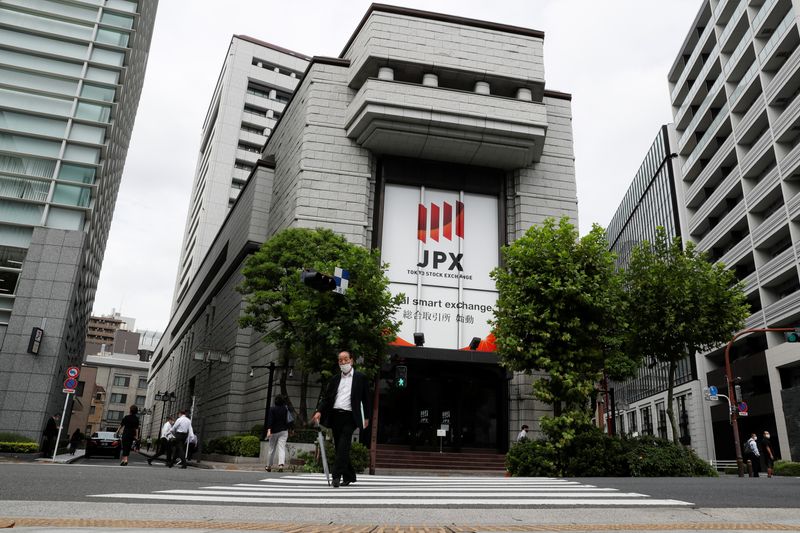By Summer Zhen
HONG KONG (Reuters) - As Japan's stock market roars to multi-decade highs, large investors with long memories say they are staying out, wary of sagging momentum and the prospect the central bank will unwind its massive monetary stimulus.
Riding a wave of buybacks and strong corporate earnings, and pumped up by a weak yen, the broad Topix index scaled peaks not seen since 1990 this week and the benchmark Nikkei, up more than 3% in four days, is near similar heights.
Yet for many, the lofty milestones are a reminder that Japan's stocks have gone sideways for years, making many foreign asset allocators reluctant to venture into the market. Some say that caution is only heightened by the perilous policy path ahead.
The research arm of BlackRock (NYSE:BLK), the world's biggest asset manager, recommends an "underweight" allocation to Japan and is waiting for policy uncertainty to clear, according to Ben Powell Asia-Pacific chief investment strategist at BlackRock Investment Institute.
"I think there is a potential sea change," he said, as some money flows in and there seems to be momentum building behind a governance push that is unlocking value from balance sheets via buybacks and other concessions to shareholders.
"But I'm old enough to remember the excitement of Abe introducing the 'three arrows'," he said, in reference to former Prime Minister Shinzo Abe's economic reforms of a decade ago aimed reviving growth.
"A very significant inflow from global investors (followed)," Powell said, "but then unfortunately, a lot of the enthusiasm has dissipated." He said more policy certainty would allow a better focus on domestic drivers.
For about two decades Japan has pressed deeper into uncharted territory with its monetary policy in a bid to revive growth after the 1990s asset bubble burst - taking interest rates to zero in 1999, below in 2016, and pinning down bond yields.
Now that inflation and growth have finally arrived, pressure is on the Bank of Japan's new governor to plot a course back to normality. He is yet to reveal his hand and the uncertainty seems to be holding back the next surge for investment and the currency, and could keep stocks from further gains.
Swiss wealth manager Union Bancaire Privée is also underweight Japan, with the policy outlook presenting currency risks. UBS' chief investment office is neutral and prefers China as a global slowdown looms.
BIG MONEY WAITING
The policy and communication challenge for new BOJ governor Kazuo Ueda is a tricky one. He has begun laying the foundations for a shift by saying the bank will debate an exit strategy from its policies once inflation looks stable.
While he believes it is too early to discuss specifics, markets are already worrying about the fate of the BOJ's vast asset holdings and expect the yen could quickly reverse last year's precipitous decline if its loose policy settings look like they may be unwound.
"(A stronger yen) will hurt outwardly focused large-conglomerates who will face an unfavorable domestic exchange rate, higher onshore borrowing costs and are also exposed to a weakening global economy," said Aninda Mitra, head of Asia macro and investment strategy at BNY Mellon (NYSE:BK) Investment Management.
To be sure, Mitra is more positive on banks and smaller companies, and plenty of investors - Warren Buffet included - believe stocks have a way to rally in Japan.
Japanese stocks are outperforming all major markets this year other than the tech-focused Nasdaq, with the Nikkei up more than 15% this year, and 11% in dollar terms, against a 7% gain for world stocks.
Buffett has also increased his stakes in Japan's trading houses and says he is eyeing other purchases - 3.65 trillion yen ($27 billion) in foreign flows this year suggest other money managers are following him.
But even those flows remain below the 4.35 trillion yen of foreigners' money that left Japan during 2022 and Morningstar data shows flows into open-ended Japan funds already turning fickle, suggesting a sustained turnaround is some time away.
"It's going to take a good few years before we have a lot of people showing much interest," said Simon Edelsten, manager of UK-based Artemis’ global select strategy fund.
"Big money never buys cheap, it buys momentum."

($1 = 135.0500 yen)
(This story has been corrected to say "policy certainty" instead of "policy uncertainty" while paraphrasing a quote in paragraph 7)